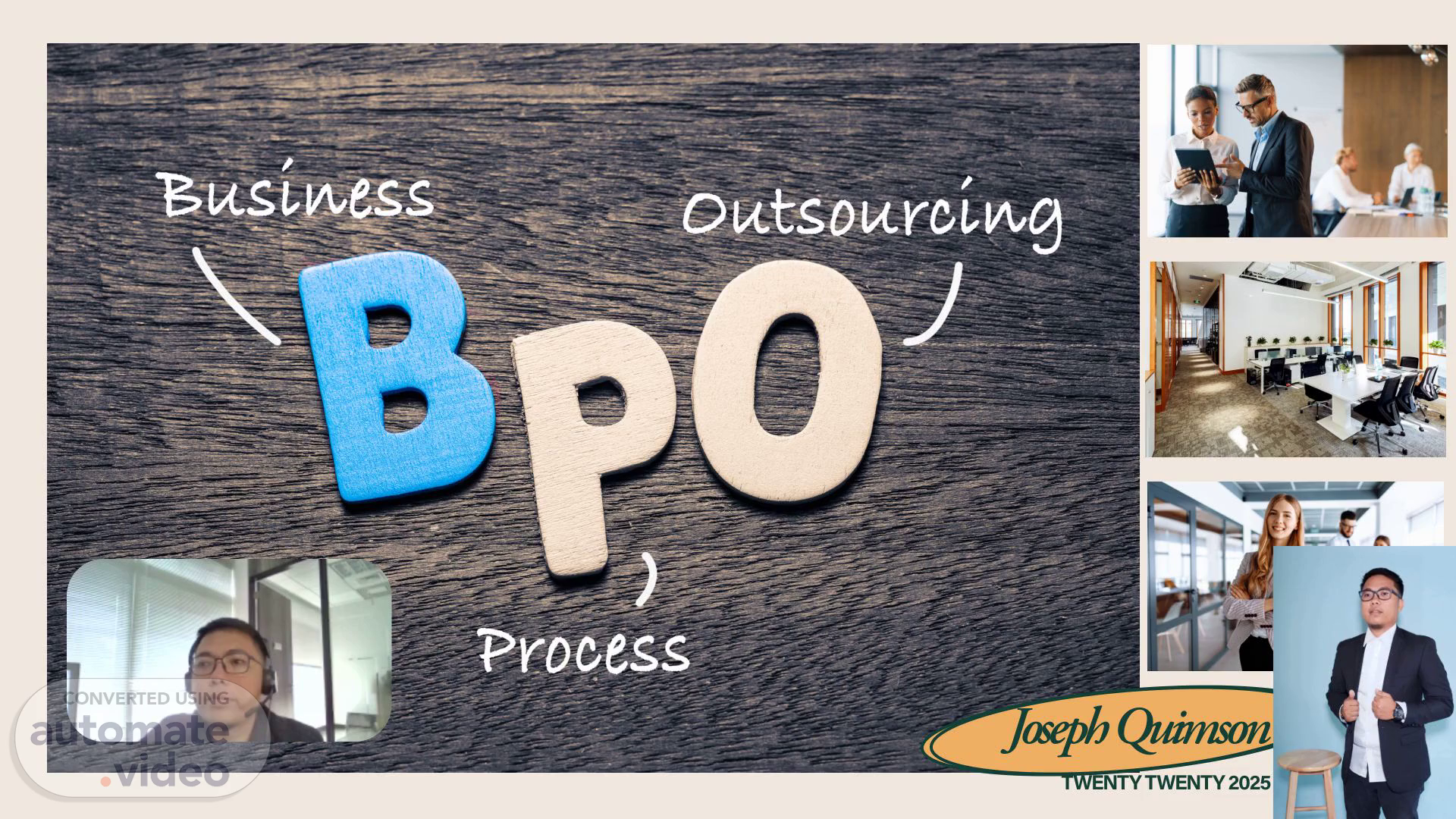Scene 1 (0s)
01 Joseph Quimson TWENTY TWENTY 2025.
Scene 2 (28s)
[Audio] We are now on slide number 2 out of 6 and it's time to learn about business process outsourcing, which has become increasingly popular in recent years. BPO involves hiring third-party providers to handle certain business functions, freeing up companies to focus on their core competencies and strategic goals. It is an important aspect of today's business environment, allowing for more efficient and cost-effective operations in the face of globalization. BPO also provides access to specialized skills and expertise, giving companies a competitive edge in their industries. We will now explore the different types and benefits of outsourcing on slide number 3..
Scene 3 (1m 10s)
[Audio] We are now at slide number 3 of our presentation on Joseph Quimson's TWENTY TWENTY 2025. Let's discuss the different types of BPO or Business Process Outsourcing that have emerged. The first one is KPO or Knowledge Process Outsourcing, which includes specialized and knowledge-based services such as research, legal services, and financial services. This has become a popular trend in the outsourcing industry. Next is LPO or Legal Process Outsourcing, which involves outsourcing legal work like document review and litigation support. This is a cost-effective way for companies to handle legal matters. Moving on to FO and BO, which stands for Front Office and Back Office BPO. Front office BPO deals with customer-facing services such as customer service and technical support, while back office BPO handles non-customer-facing tasks like HR and accounting. Both are crucial for a company's operations and growth. KPO and LPO are more complex and require highly skilled professionals, creating job opportunities for those with specialized knowledge and expertise. This benefits both companies and employees. Now, let's move on to the next slide to discuss the challenges and benefits of outsourcing. Thank you for your attention..
Scene 4 (2m 39s)
[Audio] Today, we will discuss the key benefits of Business Process Outsourcing or BPO. BPO is a popular strategic business decision that involves delegating non-core tasks to third-party providers. The first major benefit of BPO is its cost efficiency, as it allows companies to save on operational costs and invest in other areas. Another vital benefit is the access to specialized skills and technology provided by BPO providers, which can bring great value to businesses and keep them competitive. BPO also allows companies to focus on their core business by outsourcing non-core tasks, resulting in improved quality and efficiency in their core competencies. Moreover, BPO offers flexibility in scaling operations up or down without heavy investments, allowing companies to adapt to changing market conditions and remain agile. However, it is crucial for companies to carefully consider which tasks they outsource to ensure they are truly benefiting from the process. Let's move to the next slide and discuss the key components of BPO..
Scene 5 (3m 54s)
[Audio] We will now discuss the challenges and considerations in BPO communications, starting with time zone differences. As companies expand globally and outsource their services, they often have to communicate across different time zones, which can lead to breakdowns, delays, and difficulties in scheduling meetings. Language barriers are also a major challenge in BPO communication, as the language used may not always be the same as the company's native language. This can result in miscommunication and cultural barriers. Data security is another important consideration in BPO communications, as sensitive information is shared between companies. Companies must have strict security measures in place to protect their data and maintain client trust. Quality control is also crucial in BPO communications, as companies must ensure that their outsourced services meet desired standards. This can be challenging with teams in different countries and varying work cultures, leading to inconsistencies in the quality of work. In conclusion, BPO communications present numerous challenges and considerations, including managing time zones, language barriers, data security, and quality control. Thank you for your attention, and let's move on to our final slide..
Scene 6 (5m 16s)
[Audio] Welcome everyone to our presentation on Joseph Anthony M. Quimson and the future of education in 2025. My name is Joseph Quimson and I am a Course Specialist here at the university. During this presentation, we have discussed the various changes and advancements we can expect in the field of education by the year 2025. From innovative technologies to new teaching methods, the landscape of education is evolving rapidly. As we come to our final slide, I would like to express my gratitude to all of you for your attention and engagement in this topic. Your interest in this subject is a reflection of your dedication to staying ahead of the curve in the education sector. Additionally, I would like to remind you that for any further information or inquiries, I am available via email at [email protected] or you can visit our website at www.pup.edu.ph for updates. Once again, thank you and I hope you all have a wonderful day..
